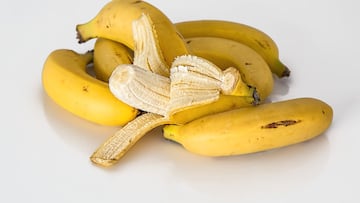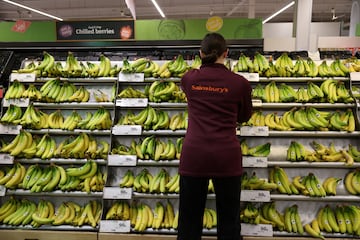FRUIT
One thing you should avoid doing when storing bananas
We take a look at how best to store your bananas if you want to keep them fresh for as long as possible.

Bananas are described by Chiquita, a company that has specialised in growing and selling the fruit since the 19th century, as “natural loners”. If you want yours to stay fresh for longer, you should avoid storing them close to other fruit such as avocados, tomatoes, peaches and apples.
This is because these and other types of fruit release ethylene, a gas that causes produce to ripen more quickly than usual. Bananas are particularly vulnerable to ethylene’s effects, Chiquita warns. Dr Dan Bebber, a biosciences expert at the UK’s University of Exeter, explains in an interview with the BBC that ethylene gas causes fruit to ripen and soften by bringing about “the breakdown of cell walls, conversion of starches to sugars and the disappearance of acids”.
Plug your bananas’ ethylene flow
Bananas are harmed by the ethylene they give off themselves, too - chiefly through their stem, alternatively known as the crown. With this in mind, says the American TV chef Elena Besser, you can also stop your bananas from going bad too quickly by placing plastic wrapping around the stems at the top of each bunch. “To make them last even longer, wrap each banana stem individually,” Besser tells NBC. (If you choose not to store your bananas away from other produce, this measure will likewise prevent the ethylene they emit from causing over-ripening in surrounding fruit.)
However, you should not cover any part of the banana other than the stem. For example, Chiquita notes that stores often sell bananas completely enclosed in plastic wrapping - a surefire way to trap in excess moisture. This, according to the Havard School of Public Health, “may promote rotting”.

Other top tips for storing bananas
The Havard School of Public Health recommends hanging up your bananas. This, it says, will stop them from bruising by “preventing excess pressure” on the bananas at the bottom of the bunch. The body also points out that this technique will ensure that each banana receives an even amount of oxygen.
You should store bananas that are yet to fully ripen at room temperature, away from direct sunlight. “Make sure they aren’t placed close to any heating or next to a cold window because extremes of temperature are not ideal,” Chiquita advises. “If you want to store bananas successfully, keep them somewhere cool and dark.”
Once your bananas have fully ripened, the company adds, you can then place them in your refrigerator to extend their freshness by “a week or two”. However, be careful not to put them in the fridge too early; cold storage may well prevent unripe bananas from ripening as they should.
Best ways to store bananas: at a glance
- Keep away from other produce
- Store at room temperature
- Avoid leaving in direct sunlight
- Wrap the stems in plastic
- Once ripe, place in fridge to extend freshness
What are the health benefits of bananas?
According to Healthline’s Adda Bjarnadottir and SaVanna Shoemaker, bananas not only contain fibre - which is linked with the prevention of constipation - but also a host of useful nutrients, such as potassium.
Thanks chiefly to their potassium content, the Havard School of Public Health describes bananas as “an important component of heart-healthy diets”, as they help you to maintain a regular heartbeat and keep your body’s sodium levels in check. Too much sodium can lead to high blood pressure.
Bananas also contain nutrients like vitamin B6 and vitamin C. The Mayo Clinic notes that the former aids brain development and promotes a healthier nervous and immune system, while the latter is crucial to your body’s healing process.
Bananas come with a range of antioxidants, too. Per WebMD’s Dean Shaban, antioxidants protect us against the harmful effects of unstable molecules, known as ‘free radicals’. If we have too many of these in our body, Shaban explains, they can damage cells and may make us more vulnerable to cancer, heart disease, high blood pressure and diabetes.
Bananas are also filling and have a low calorie count - about 100 each. That makes them an eating option that’s considered conducive to weight loss.






